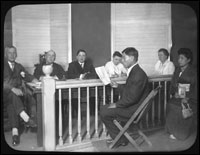|
Chapter 6: Detained on Angel Island
 |
| Chinese detainees getting tested on Angel Island. (Photo © California State Museum Resouce Center) |
We arrived in high hopes but we worried about not being able to answer the many questions that the authorities were to ask us. We were scared of getting deported.
A number of Chinese people were deported back to China. For us, returning to China would be shameful. There were rumors that a few people committed suicide rather than to be sent back to China in shame.
Women and men were segregated in Angel Island, and while we were there, we were locked up in the women's barracks. The barracks had barred doors and windows. Guards wearing green uniforms stood outside and constantly watched us. Our barrack had a handful of women who came before us and were still waiting to learn their fate — would they make it into the United States or return home in shame?
Each day, we sat and waited to be called for our immigration interview. The waiting was nerve-wracking. There wasn't anything to keep us occupied. We had no books to read and no toys to play with. We didn't study the coaching papers while being detained because we had memorized the questions and answers back in our village.
Each day, we were escorted to the dining area, where we ate Chinese food. We ate rice, meat, and vegetables. We also ate bread and fruit. The food was good and was supplemented by the government.
But we were not treated kindly. The officials seldom smiled or acknowledged us. I hated the detention and I was worried that we could be deported, but I did not have to worry for long.
After a week, we had our immigration interview. We were interrogated separately. Mother was questioned for one day, my older sister Li Hong was questioned for half a day, and I was questioned for two hours. My father had to make the trip from Oakland, taking the ferry to Angel Island, where he was questioned for two days. We didn't even know he was there until later because we had no way to communicate with him!
Finally, we were released, and we were so relieved! My father was waiting for us when we got off the ferry in San Francisco, and we traveled to Oakland where we would start our new lives in Gold Mountain — our name for America.
I was so upset by my experience that for 50 years I refused to talk about Angel Island. It was not until 1985 that I was able to talk and write about it.
|

